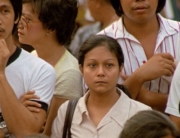Chen Kaige was one of the leading directors of China’s Fifth Generation, a group of filmmakers who came of age in the 1980s. Chen’s opulent 1993 historical epic, Farewell My Concubine, was an international sensation. It shared the Palme d’Or at Cannes with The Piano, earned two Oscar nominations, and even ran afoul of Chinese authorities, who briefly banned it back home, until the outcry forced them to allowed it back into theaters, albeit in a lightly censored form.
Now, three decades later, Farewell My Concubine has returned, in all its visual splendor and with 14 minutes restored, after Miramax’s infamous Harvey Weinstein saw fit to trim the original movie back in the day for American viewers, who apparently could handle a 157-minute movie but not one that was 171 minutes long.
The drama spans more than 50 years, from 1924 to 1977, dramatizing the lives of two longtime friends, Dieyi and Xiaolou, who meet while in the all-boys troupe of the Peking Opera. They both grow up as masters of their acting craft and become stars, with Xiaolou taking on heroic, masculine roles and Dieyi tackling passive, feminine parts. Leslie Cheung (Dieyi) and Zhang Fengyi (Xiaolou) give impeccable performances.
In the context of a troupe consisting of only men, it’s unsurprising that Dieyi becomes sexually attracted to Xiaolou, although it remains unrequited. The homoerotic subtext—which flustered the Chinese censors—remains central to a film that foregrounds identity confusion and the blurring of stage performance and real life, often bluntly so. Early on, one of the troupe’s teachers says to Dieyi, “You really are in character. You can’t even tell male from female.” When Xiaolou falls in love with and marries Juxian, a willful courtesan who’s played with gusto by a radiant Gong Li, Dieyi is left outside this new relationship, but still part of an unspoken love triangle informed by jealousy, guilt, and finally—and fatally—betrayal.
Chen gives this story a political backdrop encompassing a half-century of Chinese history, from the end of the warlord era in the opening sequences (set in 1924) and the Second Sino-Japanese war of the 1930s to the forceful 1949 Communist takeover and the start of the Cultural Revolution in 1966. At times, the grand scale of the momentous political events threatens to swallow up the admittedly melodramatic, even soap opera–ish story of Dieyi and Xiaolou’s tumultuous relationship. Chen often sacrifices subtlety for sumptuousness, but the inexorable visual sweep carries along the protagonists as well as the viewers. (The stunning, Oscar-nominated cinematography is by Gu Changwei.)
Chen is at his best in some of the more intimate moments, when the focus is on the drudgery of the young boys while at the opera school, and how the repeated whippings, beatings, and mental cruelty from their teachers causes psychological and physical exhaustion. History repeats itself decades later when the now-grown stars visit their elderly and still imposing teacher, Master Guan, who finds it easy to make them cower and even beat them again under the pretext that they have neglected their art for mere fame.
The film’s most piercing sequence occurs when Dieyi, while watching a Peking Opera performance of Farewell My Concubine years before he will star in it with Xiaolou, is so taken with its beauty and artistry that he sobs and mutters to himself, “How many beatings does it take to become a star”? The truth of that line carries more emotional weight than the more ornate and splashy scenes that surround and often overwhelm it.

















Leave A Comment